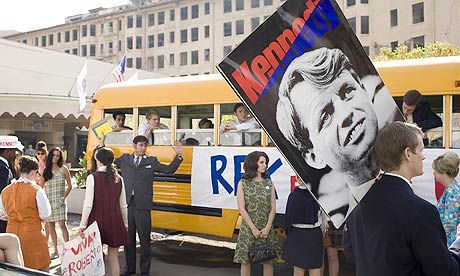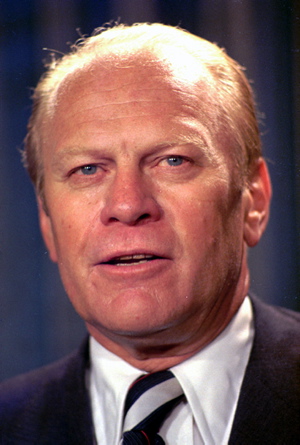“As President, my primary concern must always be the greatest good of all the people of the United States whose servant I am. As a man, my first consideration is to be true to my own convictions and my own conscience. My conscience tells me clearly and certainly that I cannot prolong the bad dreams that continue to reopen a chapter that is closed. My conscience tells me that only I, as President, have the constitutional power to firmly shut and seal this book.” Gerald Ford, 1913-2006.
Category: History
Give ’em Hell Dubya?
The buck stops here? Not hardly. Grasping for historical validation wherever he can find it, Dubya has apparently begun to fancy himself a modern-day Truman. “James G. Hershberg, a Cold War historian at George Washington University, said he doubts that history will judge Bush as kindly as it has Truman, saying Truman’s roles in fostering European recovery and building the NATO alliance were seen as solid accomplishments at the time. ‘Bush, by contrast, lacks any successes of comparable magnitude to compensate for his mismanagement of the Iraq war and will be hard-pressed to produce any in his last two years’.”
Prayers for Tim.
Get well soon, Tim Johnson. Oof, talk about terrible news on several levels. One hopes the Senator will make a full and complete recovery after his AVM surgery, and we won’t have to think too deeply about the possibility of a Senate turnover. Fortunately, there seems to be a good deal of precedent for long absences from the chamber — my first thought (other than Nate Fisher and Narm!) was Charles Sumner’s three-year absence after the caning, but there are apparently many 20th century examples too.
Kofi’s Parting Shot.
“As [Harry] Truman said, ‘We must, once and for all, prove by our acts conclusively that right has might.’ That’s why this country has historically been in the vanguard of the global human rights movement. But that lead can only be maintained if America remains true to its principles, including in the struggle against terrorism. When it appears to abandon its own ideas and objectives, its friends abroad are naturally troubled and confused.” As Kofi Annan bids farewell to his post at the UN, he offers some words of wisdom to America — and to Dubya — on our nation’s role in the world.
Spartans via Kiwi.
Two more minutes before my Internet time runs out and I disappear back into the ether…so, before I go, here’s the full trailer for Zack Snyder’s 300. Not as effective as — and somewhat derivative of — the grand teaser (and still no sign of McNulty or Faramir), but I’ll probably still catch it, if nothing else than to see what’s in store for The Watchmen.
Murder on the Orientalist Express.
“Said’s everything-but-the-kitchen-sink approach is counterproductive. It may have swelled the ranks of subaltern studies programs and provided grist for numerous postcolonial studies Ph.D. theses, but that doesn’t make his argument correct. In the end, bad books are just bad books, and when they are canonized for instrumental reasons, the result is a coarsening of thought and an ever-widening and unhealthy divide between the academy and mainstream culture.” In his review of Robert Irwin’s Dangerous Knowledge: Orientalism and Its Discontents, Salon‘s Gary Kamiya rails against the canonical status of Edward Said’s Orientalism. “Said’s radically skeptical position…was so abstract and chameleonic that it was impossible to disprove it, since it constantly dissolved (and hid behind) a multitude of deconstructive readings.” At the risk of seeming relentlessly pre-mo, I also tend to get irritated with arguments that rely on the immutability and inescapability of an all-powerful, trans-historical discourse. But at least, unlike too many of his advocates, Said’s work is relatively clear and readable. When it comes to a lot of post-colonial writing, I wonder: Is it that the subaltern cannot speak, or that nobody can hear him/her over all the jargon-riddled shouting?
A Legacy of Failure.
“Historians are loath to predict the future. It is impossible to say with certainty how Bush will be ranked in, say, 2050. But somehow, in his first six years in office he has managed to combine the lapses of leadership, misguided policies and abuse of power of his failed predecessors. I think there is no alternative but to rank him as the worst president in U.S. history.” Columbia’s Eric Foner makes the case for Dubya as the worst president ever. Also weighing in on the question: Columbia PhD (and Slate columnist) David Greenberg, Douglas Brinkley, Michael Lind, and Vincent J. Cannato. (I discussed Dubya’s ranking briefly here.)
Paying for Plaudits.
Considered historically horrible by the ever-expanding reality-based community, Dubya and his advocates plan to remedy the damage by buying their way into the hearts of historians. “Bush’s institute will hire conservative scholars and ‘give them money to write papers and books favorable to the President’s policies,’ one Bush insider said.” Hmm…don’t expect too many Bancroft winners out of that bunch. (Via The Oak.)
The Ballad of Bobby.

“Now that Dr. King is gone, there’s no one left but Bobby.” And, tragically, America would only have him for two more months. It’s hard to fault the sentiment behind Emilio Estevez’s Bobby, a humane, warm-hearted paean to the slain Senator, whose untimely end marked the final death rattle of hope for countless American liberals and progressives in the sixties. But, frankly, the film — while easy to sit through, to be sure — is also confused and overstuffed. It attempts to be Grand Hotel by way of RFK: Dozens of disconnected lives that intertwine one fateful night and that are ultimately bonded by their common humanity, as so eloquently articulated by Kennedy. But, however ambitious and meritorious its message and its patron saint, Bobby is a well-meaning muddle. The powerful stock footage and a few brief moments aside, a lot of the film just falls flat.
Due to its huge cast and multiplicity of stories, Bobby defies a full summation. Nevertheless, the film follows countless recognizable actors as they go about their lives at the Ambassador Hotel on June 4, 1968, the day before RFK was shot by disgruntled Palestinian Sirhan Sirhan. Among them are elder statesmen (Anthony Hopkins, Harry Belafonte), former A-listers turned B-listers (Emilio Estevez, Christian Slater), aging starlets (Sharon Stone, Demi Moore), TV standbys (Helen Hunt, David Krumholtz), likable character actors (William H. Macy, Freddy Rodriguez), strikingly attractive newcomers (Mary Elizabeth Winstead, Svetlana Metkina), and Frodo (playing, for all intent and purposes, Frodo.) Almost all of the performances are solid and likable (with the notable exception of Ashton Kutcher as a drug dealer — it’s unbelievable how a guy who’s made his living playing a stoner for years is so thoroughly implausible at it — he’s like a kid in a school play.) But there’s a lot of unnecessary overlap or what comes across as extraneous filler in these tales. Two separate stories (Wood and Lindsay Lohan’s quickie marriage, Shia La Boeuf and Brian Geraghty’s day off) cover basically the same ground about Vietnam. Hopkins, Belafonte, Moore, and Stone all talk about the indignities of growing old, while Stone, Macy, Moore, Estevez, Hunt, and Martin Sheen all lament failing marriages…but to what purpose? What, really, does all this have to do with RFK? I get it — it’s about shared humanity. But Bobby tries to do too much in the time given, and would’ve been more effective, I think, if it’d had been pared down some.
The most resonant parts of Bobby are the storylines involving Kennedy campaign workers (Joshua Jackson, Nick Cannon) and, most notably, the simmering racial tension among the kitchen staff (Freddy Rodriguez, Jacob Vargas, Lawrence Fishburne). The latter tale is particularly interesting — despite Slater being stuck as a cartoon “racist but a real person too” barely this side of Matt Dillon in Crash — since it highlights the concerns and aspirations of Latino immigrants, who are often completely neglected in movies dwelling on race in America (even in otherwise sterling shows like The Wire.) But, even here, it’s ultimately played too broadly: What we’re left with are “life is a blueberry cobbler” metaphors and monologues about King Arthur that’ll just make you wince. The problems with the movie can be summed up by the footage used of Bobby at the Ambassador Hotel — obviously powerful stuff. Unfortunately, it’s overlaid with Simon & Garfunkel’s “The Sound of Silence,” which even without the obvious Graduate overtones is entirely too broad a pick — It detracts from rather than enhances the already potent archival footage.
 Still, I don’t want to suggest that I’m completely hating on Bobby. For all its ham-handedness, I enjoyed the experience, and I sat there with a smile on my face through most of the film. And I do applaud Estevez’s obviously strong admiration for Senator Kennedy. I was recently on a date where discussion arose as to whether things would’ve been different if Bobby had lived. She thought not, or rather that it’d be impossible to tell. I’m more inclined to agree with Michael Sandel, who wrote that: “Had he lived, he might have set progressive politics on a new, more successful course. In the decades since his death, the Democratic Party has failed to recover the moral energy and bold public purpose to which RFK gave voice.” Regardless, as with Dr. King, we shouldn’t even have to ask this question. Both men who were continuing to grow and develop, Dr. King and Bobby were tragically ripped from us before their time, a back-to-back blow in an already miserable year that felled progressive ambition in America for decades. I have to think that our nation would be a brighter, happier, and more compassionate place in the years since if we could have continued to benefit from their leadership and counsel.
Still, I don’t want to suggest that I’m completely hating on Bobby. For all its ham-handedness, I enjoyed the experience, and I sat there with a smile on my face through most of the film. And I do applaud Estevez’s obviously strong admiration for Senator Kennedy. I was recently on a date where discussion arose as to whether things would’ve been different if Bobby had lived. She thought not, or rather that it’d be impossible to tell. I’m more inclined to agree with Michael Sandel, who wrote that: “Had he lived, he might have set progressive politics on a new, more successful course. In the decades since his death, the Democratic Party has failed to recover the moral energy and bold public purpose to which RFK gave voice.” Regardless, as with Dr. King, we shouldn’t even have to ask this question. Both men who were continuing to grow and develop, Dr. King and Bobby were tragically ripped from us before their time, a back-to-back blow in an already miserable year that felled progressive ambition in America for decades. I have to think that our nation would be a brighter, happier, and more compassionate place in the years since if we could have continued to benefit from their leadership and counsel.
Since we cannot, we can only honor their examples and remember their words. In the end, Bobby could’ve been a much worse movie than it in fact is, and I still would give it credit for reminding us of Senator Kennedy’s essential creed: “But we can perhaps remember — even if only for a time –that those who live with us are our brothers; that they share with us the same short moment of life; that they seek — as we do — nothing but the chance to live out their lives in purpose and happiness, winning what satisfaction and fulfillment they can.”
The Free Market Principal.
“As George Shultz liked to say: ‘Everybody loves to argue with Milton, particularly when he isn’t there.'” Milton Friedman, 1912-2006.

